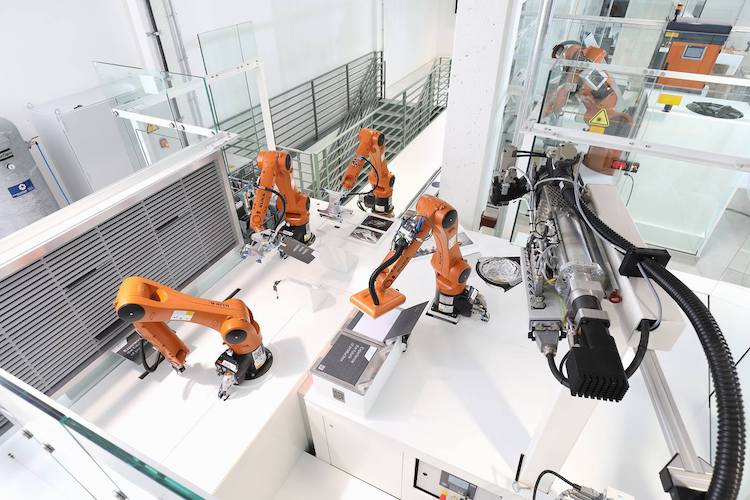
Kuka launches ‘smart factory as a service’ with partners
Industrial robot giant Kuka is partnering with two other companies to offer what it describes as a “SmartFactory as a Service”.
The two other companies are insurance giant Munich Re and MHP, which is a process supplier and a subsidiary of Porsche, the automotive company.
Kuka says the “revolutionary co-operation opens the door for new ideas”.
The three companies say they are “bundling their synergies” and “combining of core competencies in software integration, automation technology, systems engineering as well as risk and financial management” to create “visionary production solutions for the requirements of the future”.
It’s certainly an ambitious project, although aimed at what has become an established trend.
And although it’s quite a new and distinct market, industrial companies are increasingly looking to integrate smart factory principles in the operations.
Simply put, the term “smart factory” refers to making an industrial operation more digital – connected to the industrial internet of things and combining and streamlining an entire operation using computers.
This is the so-called “OT-IT” convergence, which means combining operations technology – which is usually traditional mechanical machines – with information technology, such as the IIoT, product lifecycle management software, enterprise resource planning applications, and manufacturing execution systems, and so on.
A “smart factory” is also envisioned to integrate more robotics and automation technologies, as well as other advanced manufacturing methods, such as 3D printing.
Manufacturing companies have to react ever more quickly to changing customer requirements, Kuka says.
Dr Till Reuter, CEO of Kuka, says: “A plant’s ability to adapt is the key criterion in making manufacturing fit for the future. Our clients face the challenge of responding swiftly and flexibly to market needs.
“SmartFactory as a Service can achieve this. Our cooperation with Munich Re and MHP brings the business models of the future a great deal closer.”
Flexible production sequences – with, for example, the possibility of modifying product types or quantities at will – are becoming increasingly important.
At the same time, quality and profitability must not suffer, says Kuka, adding: “SmartFactory as a Service enables companies to master the challenges of the future through completely digitalized production sequences.”
Dr Ralf Hofmann, CEO of MHP, says: “Acceleration can no longer be confined to the shop floor.
“We need a self-contained “engineering value chain” – which means consistent data, processes and organisations.
“This end-to-end workflow facilitates the optimisation of highly individualised manufacturing – mass customisation using series production tools.”
Dr Torsten Jeworrek, member of Munich Re’s board of management, says: “The combination of state-of-the-art manufacturing technology with the digitalisation of all processes, and with risk management and financial strength enables a new and innovative form of manufacturing.
“One that we plan to develop in partnership with our clients, supporting them on their journey into the digital future.”
SmartFactory as a Service is “the product of intelligent cooperation between MHP, Kuka and Munich Re”, say the companies, to combine their core competencies in:
- software integration;
- automation technology;
- systems engineering; and
- risk and financial management.
Together with further partners from the automotive industry, new production solutions are being developed and tested for dynamically changing customer requirements.
With this combined know-how, the initiative is not only able to support its customers from the initial idea right through to the finished solution; the company is also able to advise customers on the various smart networking opportunities for everyday production brought about by Industrie 4.0 and how to minimize risks at the same time.
“The intelligent factory allows customers to use scalable, fully automatic and adaptable production capacities as a service at variable cost,” says Kuka.
“It also shortens traditional market launch times and offers maximum reliability and quality through integrated risk management.”
Kuka and its partners are planning to hold a number of seminars to go into the details of the smart factory service with expert presentations.
“Already today, SmartFactory as a Service demonstrates that the flexible production systems of the future know no limits,” adds Kuka.
“A broad spectrum of services, machines, robots and software platforms can be linked to one another without making system operation too complex. In fact, an intuitive interface makes ‘SmartFactory as a Service’ easy to use for every customer.
“SmartFactory as a Service is capable of manufacturing, packaging and delivering a highly customized product in an extremely short cycle time.
“The product is a puzzle, manufactured in a batch size of one, that the customers can take home with them.”
The “batch size of one” refers to another industry trend also known as “mass customisation”.
It means a production system which can provide highly-customised products to individual customers.
Whereas processes developed past enabled manufacturers to produce large numbers of items which were identical, the emphasis now is to develop processes which can cope with high levels of differentiation.
The three companies in this alliance say their SmartFactory as a Service will “shorten new products’ time to market by up to 30 percent”.
This will significantly improve one of the most decisive competitive factors for manufacturers.
The way the companies have structured their partnership is as follows:
- Kuka develops the robot-based automated plant;
- MHP provides its digitalisation expertise, offering consultancy on the closed-loop manufacturing approach throughout the project phase, and delivers systems integration; and
- Munich Re rounds out the business model with integrated risk management and innovative finance models.
Industry is currently experiencing a sea change brought about by dynamically morphing client expectations, putting manufacturers under great pressure to innovate, say the companies.
To remain competitive, they are faced with the challenge of adapting their traditional processes.
This transformation demands great flexibility and transparency along the entire value chain – and access to critical resources. It is generating high capital costs and harbours substantial uncertainty and risks.

